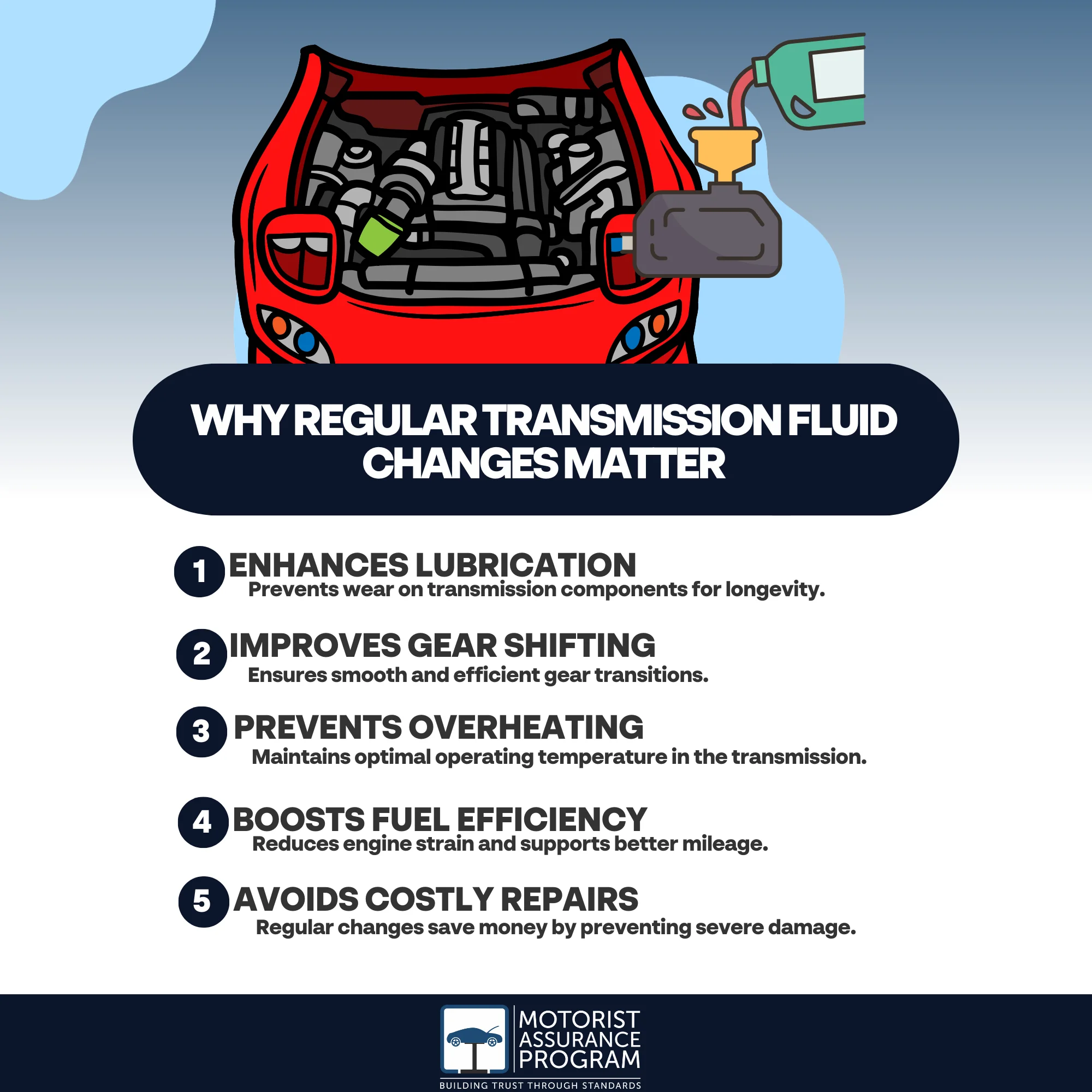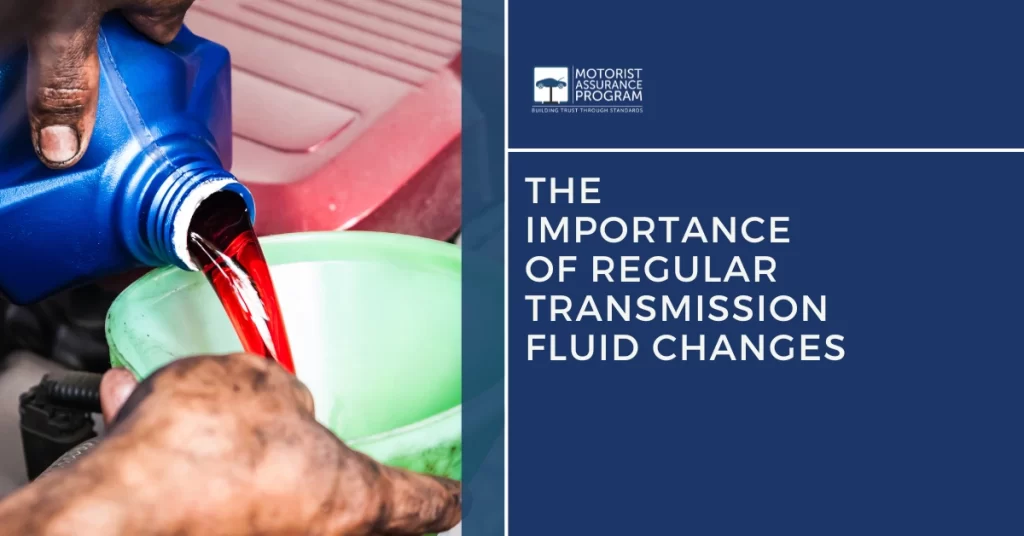Regular transmission fluid changes are vital for your vehicle’s health. They guarantee proper lubrication of moving parts, facilitating smooth gear shifts. Old or contaminated fluid can cause overheating and wear, leading to costly repairs down the line. By changing the fluid every 30,000 to 60,000 miles—or more often under harsh conditions—you maintain peak performance and fuel efficiency. Fresh fluid reduces friction, supporting better engine function and drivability. Neglecting this maintenance can result in slipping gears and reduced fuel economy. Understanding these factors can help you make more informed decisions about your vehicle’s care and longevity.

Key Takeaways
- Regular transmission fluid changes ensure proper lubrication, stretching the longevity of transmission components and preventing severe damage.
- Changing fluid at recommended intervals helps maintain optimal temperature levels, preventing overheating during operation.
- Fresh transmission fluid improves gear shifting performance, leading to a smoother driving experience and better fuel efficiency.
- Clean fluid reduces friction, which can lower fuel consumption and optimize overall engine performance.
- Preventive maintenance through regular fluid changes can save money by avoiding costly transmission repairs down the line.
Avoid Damage to Transmission
Transmission fluid plays an crucial role in maintaining the health of your vehicle’s transmission system. It lubricates the various moving parts, helps in heat dissipation, and facilitates smooth gear shifts. Over time, the fluid can become contaminated with debris and lose its effectiveness, leading to potential damage to your transmission. To prevent this, you need to change transmission fluid regularly.
So, how often should you change transmission fluid? While it can vary based on vehicle make and model, a general guideline is every 30,000 to 60,000 miles. Check your owner’s manual for specific recommendations tailored to your vehicle.
If you’re wondering, should I change my transmission fluid regardless of mileage, the answer is yes. Factors like driving conditions, towing, or frequent stop-and-go traffic can necessitate more frequent changes.
Neglecting to change transmission fluid can result in increased wear on transmission components, overheating, and ultimately, costly repairs. By adhering to a regular maintenance schedule, you’re taking proactive steps to avoid damage to your transmission and guarantee its longevity. Prioritize this task to keep your vehicle running smoothly and efficiently.
Maintain Performance
Keeping your vehicle’s performance in good shape relies heavily on regular transmission fluid changes. The transmission fluid plays a pivotal role in lubricating the internal components, ensuring smooth gear shifts, and maintaining ideal temperature levels. If you neglect to change it regularly, you risk compromising the overall performance of your vehicle.
To maintain your vehicle’s performance, consider the following:
- Check your owner’s manual**: It provides specific guidelines on how often to change transmission fluid, often every 30,000 to 60,000 miles.
- Monitor fluid condition**: Regularly inspect the color and smell of the fluid. Dark or burnt fluid signals it’s time for a change.
- Professional inspection: If you’re uncertain how to change transmission fluid, consult a qualified technician who can perform the task accurately.
- Schedule changes based on driving conditions: Frequent towing or stop-and-go driving may require more frequent changes.
- Pay attention to performance issues**: Slipping gears or delayed shifting can indicate that it’s time to change the fluid.
Helps maintain fuel efficiency by reducing strain on the engine
Regularly changing your transmission fluid not only improves performance but also plays a significant role in maintaining fuel efficiency. When your transmission fluid is old or contaminated, it can lead to increased friction and overheating, causing your engine to work harder.
This added strain directly affects your vehicle’s fuel consumption, making it less efficient. By ensuring you change your transmission fluid on schedule, you reduce this strain and promote smoother gear shifts, which optimizes engine performance.
Prevent Big Repairs
Changing your transmission fluid at recommended intervals can prevent costly repairs down the line. Neglecting this vital maintenance can lead to severe transmission issues, which are often expensive to fix. To avoid these extensive repairs, you should know how often you should change transmission fluid—typically every 30,000 to 60,000 miles, depending on your vehicle.
Consider these key points:
- Prolongs Transmission Life: Fresh fluid reduces wear and tear on components.
- Enhances Performance: Clean fluid guarantees smooth gear shifts, improving overall drivability.
- Prevents Overheating: Proper fluid levels and quality help regulate temperature, preventing overheating.
- Reduces Contaminants: Regular changes eliminate dirt and sludge that can harm the transmission.
- Saves Money: Comparing how much a transmission fluid change costs versus major repairs shows significant savings.
If you’re wondering where to get a transmission fluid change, local auto shops or dealerships can assist. By staying proactive with your transmission fluid maintenance, you can avoid the hassle and expense of major repairs, guaranteeing your vehicle runs smoothly for years to come.
Frequently Asked Questions
How Often Should I Change My Transmission Fluid?
You should change your transmission fluid every 30,000 to 60,000 miles, depending on your vehicle’s make and model. Always consult your owner’s manual for specific recommendations to maintain ideal transmission performance and longevity.
What Are the Signs of Low Transmission Fluid?
If you notice slipping gears, delayed shifts, or unusual noises, it’s likely you’re experiencing low transmission fluid. Also check for fluid leaks under your vehicle and monitor for a burnt smell during operation.
Can I Change Transmission Fluid Myself?
Sure, you can change transmission fluid yourself. Gather the necessary tools, consult your vehicle’s manual for specific procedures, and make certain you properly dispose of old fluid. Just take your time and double-check everything for safety.
What Type of Transmission Fluid Does My Vehicle Need?
To determine the correct transmission fluid for your vehicle, consult your owner’s manual or manufacturer’s specifications. You’ll need either automatic transmission fluid (ATF) or manual transmission fluid, depending on your transmission type and model year.
Does Transmission Fluid Expire or Degrade Over Time?
Transmission fluid doesn’t exactly expire, but it does degrade over time, losing its viscosity and protective properties. It needs proper care to maintain its quality and performance.
Conclusion
In conclusion, regularly changing your transmission fluid isn’t just maintenance; it’s the lifeline of your vehicle’s performance. Think of it as giving your car a revitalizing drink, allowing it to run smoothly and efficiently. By staying proactive, you’re not only preventing costly repairs but also improving fuel efficiency and extending the life of your transmission. Don’t wait for a warning sign—take charge of your vehicle’s health today to guarantee it drives like a dream for years to come.


